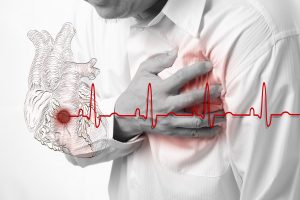Symptoms of heart disease

Symptoms of heart disease vary according to the disease, as follows:
Symptoms of Cardiovascular Disease (CVD):
Cardiovascular disease is caused by narrowing, blockage or stiffness in the blood vessels, leading to the lack of enough blood to receive the heart, brain or other organs in the body.
Symptoms of cardiovascular disease include:
Chest pain (angina pectoris)
Dyspnea
Pain, numbness, weakness or feeling cold in the legs and arms, if there is a narrowing of blood vessels in them
Symptoms of heart disease caused by arrhythmia:
System disorder is arrhythmias. System disorders may include heartbeat at a rate higher than normal, at a rate lower than normal or irregularly.
Heart disease symptoms associated with heart rhythm systems include:
Flutter (tremor) in the chest
Tachycardia
Slow heartbeat (slow pulse Bradycardia)
pain in chest
Tightness of breath
Dizziness
Fuzzy (Fainting – Fainting / Syncope) or a condition close to the foals
Symptoms of heart disease caused by a heart defect:
The acute congenital defect (Congenital defect) can usually be detected within hours, days, weeks or months after birth. Symptoms of heart disease include:
Light gray or blue skin (glowing – Cyanosis)
Abdominal swelling, in the legs or around the eyes
Tightness of breath during eating, which causes an insufficient rise in weight
Less severe and serious congenital defects are diagnosed, often, only late in childhood or even in adulthood.
Symptoms of congenital heart defects, which do not pose an immediate risk to life, include:
Ease of shortness of breath, as a result of physical activity or sports
Ease of feeling tired, as a result of physical or athletic activity
Accumulation of fluids in the heart or in the lungs
Swelling in the hands, ankles or in the soles of the feet
Heart disease symptoms caused by Cardiomyopathy:
Myocardial infarction means that the heart muscle becomes thicker and more rigid. Sometimes, in the early stages of myocardial infarction, there are no symptoms at all.
As the disease worsens and worsens, its symptoms may include:
Shortness of breath when exerting any effort, or even rest time
Swollen legs, ankles and feet
Abdominal swelling due to accumulation of fluid
Fatigue
Arrhythmias accelerate, palpitations or fluttering
Dizziness and fainting
Symptoms of heart disease caused by contamination
There are three types of heart infections:
Pericarditis (Pericarditis), a tissue inflammation (membrane) that covers the heart
Myocarditis affects the middle layer of the myocardium
Endocarditis affects the internal membrane separating the heart chambers and valves
Symptoms of heart disease caused by heart infection vary, depending on the type of infection, including:
Fever
shortness of breath
Weakness or fatigue
Swelling in the legs or in the abdomen
Changes in heart rate
Dry or persistent cough
Rashes or unusual patches
Symptoms of heart disease caused by a problem in the heart valves:
The heart has four valves:
Aortic valve
Mitral valve (mitral valve)
Pulmonary valve
Triplex (Ttricuspid valve)
All heart valves open and close to direct blood flow through the heart.
Heart valves may be damaged due to several factors that cause constriction, leakage (abnormal flow or insufficiency) or incomplete closure.
The symptoms of heart disease caused by damage in the heart valves differ depending on the valve of the affected heart and include:
Fatigue
shortness of breath
Arrhythmia or hear heart murmurs
Swelling in the palm of the feet or in the ankles
pain in chest
fainting.
The risk factors that lead to heart disease include:
Smoking
Malnutrition
Hypertension
Hypercholesterolemia
Diabetes
Obesity
Lack of physical activity
Continuous tension
Poor hygiene.

